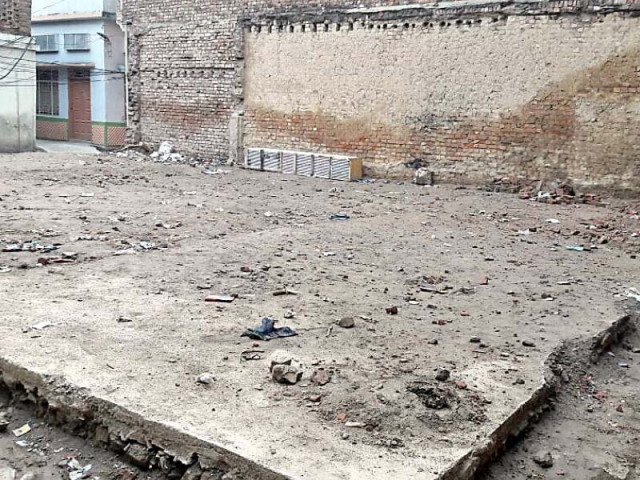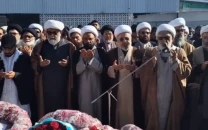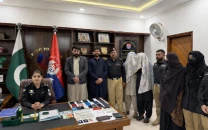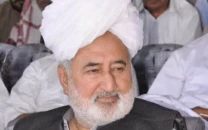Minority rights: Another Hindu temple demolished
Haripur locals dispute that a dharamshala, not a temple, stood on the land

PHOTO: FILE
Another Hindu temple in the region has fallen victim to the apathy of baboos who are supposed to protect and preserve worship places of minorities.
Given recent history, however, it is likely that the temple will be replaced by a commercial building at some point in the near future.
The Soha temple used to be a corner stone of the Mohalla Soha – a suburb of Haripur. Before being torn down, it once stood in an open plot – now marked as construction site of a commercial structure.
The issue was even brought to the attention of the Evacuee Trust Property Board (ETPB) and the local police, since a worship place cannot be demolished or sold under the law, but it seemed to have not made any difference.
The Haripur police launched an inquiry after receiving a letter on December 14, 2016, from the Evacuee Trust Property Board (ETPB) assistant administrator in Hasanabdal who sought an inquiry and an FIR against all people involved in the demolition of the temple.
Katas Raj Temples: last vestige of Hindu era
The inquiry found that the ETPB had ‘sold’ the temple to Muhammad Nawaz Khan, a resident of Mohallah Motiyan, through a registration deed during an open auction in September 2003. Nawaz, who had been occupying the temple since 1972 as a tenant, paid for the entire structure and later sold the dilapidated building to Nisar Begum, a resident of the same locality.
Nisar, who also bought the building on a registration deed properly registered with the revenue department in Haripur, sold it to Saeed Akhtar, a trader from Haripur.
Locals said that demolition work on the temple was split between the ownership periods of Nisar and Akhtar.
Later, when ETPB and revenue department officials visited the site, they backed off from their previous stance to lodge an FIR against Akhtar and Nisar.
“It (complaint) was made…merely [based] on a local newspaper report to maintain law and order in the area and to avoid any untoward situation,” read a letter written by ETPB Assistant Administrator Muhammad Abdullah on December 23, 2016.
In the same letter, Abdullah claimed that he had visited the temple site with other officials of ETPB and found that there was nothing but an open plot registered with ETPB which had been sold to Muhammad Nawaz Khan on September 17, 2003 for Rs347,742 - including the cost of the superstructure.
The temple “was non-functional and in dilapidated condition and was included in the sold out area by the competent authority and the department has no concern about it,” the letter adds.
The letter further says that since the purchaser had paid its sale price, he had sole ownership over the property, complete with the right to demolish any existing structure or build new ones according to needs.
Akhtar, the current owner of the plot, confirmed to The Express Tribune that a religious building used to exist on the plot. However, he contended the fact that the building was a temple, claiming instead that the building was a dharamshala (religious guest house), and that by the time he bought it there was only an open plot with walls on three sides.
He also shared the transfer documents which carried the name of Nawaz Khan, wherein the ETPB denied that the sold out property was either part of appurtenance to shrine, a religious place or a building of historical or architectural importance.
On the demolition of the temple, Saeed said it was already in dilapidated condition for several years and was demolished by Nisar after she got a warning notice from the tehsil planning officer of the Haripur Tehsil Municipal Administration on March 4, 2009, to raze the building within 15 days.
Asked about his plans for the property, he said he wanted to build a two-storey commercial building on the site, but the Tehsil Municipal Administration was using delaying tactics as he was not ready to grease their palms. Saeed said that if the temple was non-salable property, the ETPB officials were responsible, not him or the previous two owners.
Disappearing temples
Founded by Sikh Governor Hari Singh Nalva in 1822, Haripur once had around 12 to 15 Hindu temples and three gurdawaras.
However, today only four or five temples remain, along with a gurdawara located in the main Haripur bazaar and now hosts a primary school.
The temples that still stand are occupied by shopkeepers, who rented the premises from ETPB.
Tanveer Iqbal Gilani claimed that his grandfather – local saint Chan Pir Shah - had been gifted land of the Jai Krishna Temple on GT Road by a Hindu priest and the owner of the Siri Krishan Sankat when he left Pakistan at the time of Partition. He said that the temple had been demolished around two decades ago and had been replaced by a commercial plaza.
Hindus finally get place to pray in Islamabad
Gilani accused officials of ETPB and influential locals of illegally occupying the Hindu worship places.
Several complaints regarding the illegal transfer of temple land and occupation by different government departments in Havelian, Abbottabad and Mansehra are pending before the Peshawar High Court’s Abbottabad bench.
“Worship places cannot be occupied or sold under the law as constitutional clauses 20 and 36 clearly protect the rights of the minorities,” said Advocate Zafar Iqbal, the counsel for Sham Lal, a Hindu priest from Abbottabad who had requested the court to grant him possession of the Hindu temples in Havelian and two temples in Abbottabad which are currently under the possession of different government departments.
Temple run
Speaking to The Express Tribune, retired educationist Muhammad Qasim said that the Haripur property was indeed a Hindu temple which he first saw in 1944 when his father moved their family to Haripur city.
Qasim said that although he had forgotten the temple’s exact name, he remembered that it was informally referred to as the Soha Temple and that it had been built by the Mehta Himraj when he founded Soha Mohalla during the early 1940s.
According to the octogenarian Qasim, Hindu caretakers of the temple were popular social workers who served with the Haripur Municipal Administration till Partition.
Qasim condemned the demolition of the temple, adding that it would set a bad precedent in both, Pakistan and India.
“If India starts demolishing mosques, what would our reaction be?” he asked.
Published in The Express Tribune, January 21st, 2017.



















COMMENTS
Comments are moderated and generally will be posted if they are on-topic and not abusive.
For more information, please see our Comments FAQ